It’s been 26 years since the world’s first mass-market hybrid-electric vehicle, the first-generation Toyota Prius went on sale in Japan. An updated version arrived in the U.S. four years later and, at its peak, became the best-selling vehicle in the environmentally minded California market.
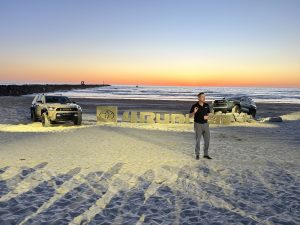
Toyota Group Vice President and General Manager of North America David Christ pulled the covers off the 2025 Toyota 4Runner during a beachfront event in San Diego on 4/9/24.
In the years since, Toyota has rapidly expanded its line-up of electrified vehicles. On Tuesday, the Japanese giant launched its latest – and 19th – hybrid model, the completely redesigned 2025 Toyota 4Runner. The SUV offers an optional iForce Max powertrain that not only delivers a significant increase in fuel economy but 76% more torque than the outgoing 4Runner.
Along with those hybrids, Toyota now offers plug-in hybrids, the bZ4X battery-electric vehicle and the Mirai hydrogen fuel-cell vehicle. It’s a “portfolio approach” meant to give buyers a choice of green technology options, explained David Christ, the group vice president and general manager of the Toyota division in the U.S. But that strategy has generated some sharp criticism from many of the same environmentalists and regulators who once hailed Toyota as an industry leader. Critics would prefer to see Toyota follow the approach taken by competitors like General Motors which is on a self-described “path to an all-electric future.”
Or, at least it was. As EV sales growth slows, GM said recently it will add some plug-ins to its line-up. Ford is delaying some EV plans to put more focus on conventional hybrids. And the Biden administration last month delayed rules that would have forced automakers to rapidly go all-electric.
To some, this is vindication for Toyota’s strategy of providing a mix of different electrified options. To Christ – pronounced “Crist” – it simply proves that Toyota is on the right track. Following the San Diego debut of the new 4Runner, Headlight.News met with the executive, who joined Toyota in 1994, to discuss his thoughts about the electrifying transformation of the auto industry.
HLN: Toyota has announced an expansive electrification strategy, but also indicated changes are in the works. What can you tell us about where things stand right now?
Christ: We’re really proud of our electrification strategy. We started with Prius 26 years ago, believe it or not, and from then to now we’ve expanded the offerings of hybrids across our line-up. We also have plugin hybrids, fuel-cell vehicles and BEVs. We’ll make the 19th vehicle in our line-up with a hybrid (with the new 2025 Toyota 4Runner). We really believe in the portfolio approach to offer different powertrains that customers can choose.
HLN: You’ll only have a few models now that aren’t electrified in some form. What are they and are they eventually going to be electrified?
Christ: The 86 and the Supra. We don’t have anything to announce on those two models right now. But we’ll continue to expand our plug-in hybrid opportunities on new models and models we sell today, as well as (conventional) hybrids and BEVs.
More Toyota News
- First Look: 2025 Toyota 4Runner: More Power, More Features, More Options
- A Week with the 2024 Toyota Prius – Winning Over Skeptics
- First Drive: 2024 Toyota Tacoma Offers More Power, More Choices
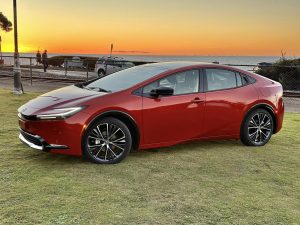
The plug-in version of Toyota’s latest hybrid, the Prius Prime, will soon be followed by versions of several other familiar Toyota models, such as the Sequoia.
HLN: Plug-in hybrid sales started out slowly but now seem to be gaining traction.
Christ: Both the Prius Prime and RAV4 Prime, our two PHEVs, have sold very well from inception. They are really high-performance vehicles and as we have been able to add more range on the electric side the more popular they have become with consumers. We’re going to continue to expand plug-ins to other parts of the line-up. We’re not prepared to make any (additional) announcements but we’re going to expand plug-in availability throughout the line-up fairly quickly.
HLN: There’s been a lot of talk that plug-ins could become more popular with people who’d like to go electric but aren’t quite ready for a pure EV. Do you see that happening?
Christ: We believe in plug-ins because we feel they’re a great bridge for somebody who wants an electric car but maybe is concerned about range or the availability to get to public charging. Plug-ins are a great options for those folks. We think plug-ins are going to expand in our line-up and across the industry.
HLN: We’re certainly seeing a change in the coverage of EVs. How do you see this?
Christ: First, there are a lot more choices for EV (buyers) than there were just a year ago. Each company is going coming out with new offerings and that will inevitably grow the business. There will be more volume but the pace of growth is slowing. We’ve always believed in the portfolio approach with BEVs, hybrids, plug-ins and fuel-cell vehicles in California. We believe all of those need to be a part of our line-up and aren’t placing our bet on any one of those technologies.
HLN: Not that long ago, you were taking hits for that strategy from folks who believed the right answer is to go all-electric. Do you feel vindicated?
Christ: We have always stuck to our plans and don’t change them based on what everyone else does. We’re going to continue to execute on our plan.
HLN: Toyota made some changes when (Akio) Toyoda (retired as CEO and was replaced by Koji) Sato. There’s been more focus on EVs than two years ago.
Christ: We have always been committed to building BEVs. We came out with the bZ4X and the (Lexus) RZ. Our plan has’’t changed. We’re just now in the implementation. And you’re going to see more BEVs from us in the future.
HLN: To be blunt, the bZ4X has gotten a mixed reception, What have you learned and what might be changed? Everybody adapts.
Christ: For every bZ we sell, we hear from the customer and the dealer. We’ve taken that feedback and we’re preparing enhancements and improvements, just like we do on our other cars. I think you’re going to see better bZs in the future and other BEVs.
HLN: When you say, “better,” what do you mean?
Christ: We don’t have anything to announce. Sorry.
HLN: What are your customers telling you?
Christ: There’s no doubt the consumer wants more range. So, we’re always looking to improve on our range. We’ll continue to modify and improve as we go.
HLN: Let’s turn to fuel-cell vehicles, You’re clicking with heavy trucks (like the prototype hydrogen-powered semis being fleet tested at the Ports of Los Angeles and Long Beach). There seems to be more trouble with passenger car models. Shell just closed down its hydrogen filling stations in California (meaning even fewer places to fill up). So, what is Toyota seeing when it comes to fuel-cell vehicles.
Christ: We believe in hydrogen technology and our fuel-cell products, like Mirai, (Toyota’s passenger model), We also announced last year we’re going to be a provider of fuel-cell powertrains to the big truck industry. We’ve even experimented with hydrogen combustion vehicles (ED: including a racing version of the Corolla). At the end of the day, I think, we’re going to continue to grow and expand though the challenge for hydrogen is that the infrastructure isn’t growing as fast as we’d like. But that infrastructure is going to improve over time. We think it’s a really good technology for the future.
HLN: Many folks think that hydrogen technology will catch on faster in the heavy truck market than the passenger car segment. Do you agree?
Christ: The trucking industry is facing a similar transition (to green technology) as the passenger car industry. But it really has just two options: either going battery-electric or hydrogen. There aren’t other options (like plug-in hybrids). So, it’s going to be interesting to see where the truck industry goes. If it goes hydrogen we would certainly love to sell more.

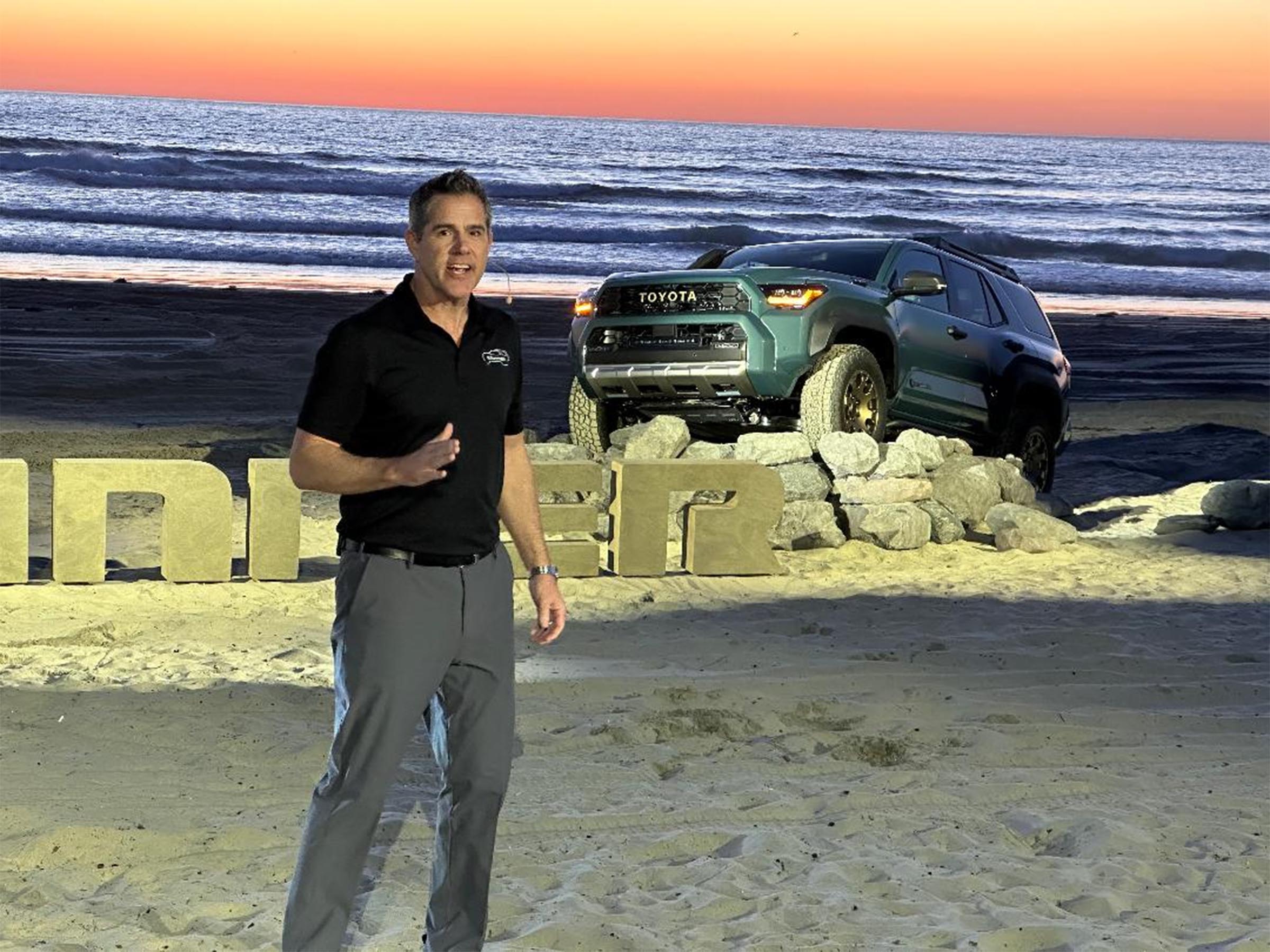
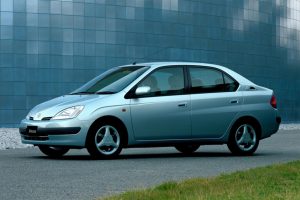
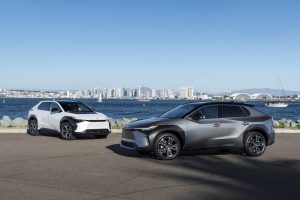
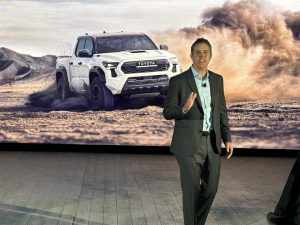
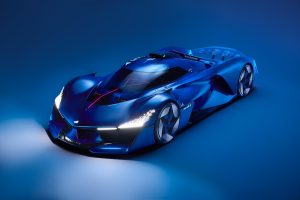
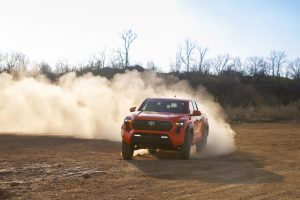
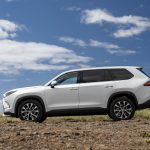
0 Comments